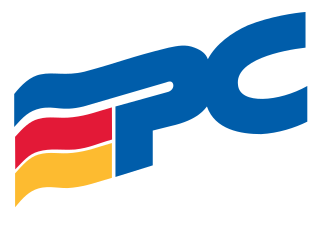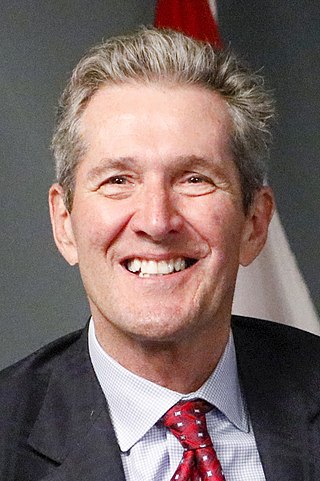Related Research Articles

Bernard Lord is a Canadian lawyer, business executive and former politician. He served as the 30th premier of New Brunswick from 1999 to 2006. Lord was appointed as board chair of Ontario Power Generation in 2014.
The Conservative Party of Canada, colloquially known as the Tories, is a federal political party in Canada. It was formed in 2003 by the merger of the two main right-leaning parties, the Progressive Conservative Party and the Canadian Alliance, the latter being the successor of the Western Canadian–based Reform Party. The party sits at the centre-right to the right of the Canadian political spectrum, with their federal rival, the Liberal Party of Canada, positioned to their left. The Conservatives are defined as a "big tent" party, practising "brokerage politics" and welcoming a broad variety of members, including "Red Tories" and "Blue Tories".

Scott A. Brison is a Canadian former politician from Nova Scotia. Brison served as the Member of Parliament (MP) for the riding of Kings-Hants from the 1997 federal election until July 2000, then from November 2000 to February 2019. He was the first openly gay MP to sit as a member of the Progressive Conservative Party. In 2003, just days after the Progressive Conservatives and the more socially conservative Canadian Alliance voted to merge into the Conservative Party of Canada, Brison crossed the floor to join the Liberal Party.

The Progressive Conservative Party of Ontario, often shortened to the Ontario PC Party or simply the PCs, colloquially known as the Tories, is a centre to centre-right political party in Ontario, Canada.
The New Brunswick Liberal Association, more popularly known as the New Brunswick Liberal Party or Liberal Party of New Brunswick, is one of the two major provincial political parties in New Brunswick, Canada. The party descended from both the Confederation Party and the Anti-Confederation Party whose members split into left-wing and right-wing groups following the creation of Canada as a nation in 1867.

The 2004 Conservative Party of Canada leadership election took place on March 20, 2004, in Toronto, Ontario, and resulted in the election of Stephen Harper as the first leader of the new Conservative Party of Canada. The Conservative Party was formed by the merger of the Canadian Alliance and the Progressive Conservative Party of Canada, in December 2003.
The Liberal Party of Newfoundland and Labrador is a political party in the province of Newfoundland and Labrador, Canada. The party is the provincial branch, and affiliate of the federal Liberal Party of Canada. It has served as the Government of Newfoundland and Labrador since December 14, 2015. The NL Liberals were re-elected to a majority government in the 2021 provincial election.

The Progressive Conservative Party of New Brunswick is a centre-right, conservative political party in the Canadian province of New Brunswick. The party has its origins in the pre-Canadian confederation Conservative Party that opposed the granting of responsible government to the colony. It has historically followed the Red Tory tradition. The Progressive Conservative Party currently leads the provincial government since 2018 under Premier Blaine Higgs.

Brian William Pallister is a Canadian politician who served as the 22nd premier of Manitoba from 2016 until 2021. He served as leader of the Progressive Conservative Party of Manitoba from 2012 to 2021. He was previously a cabinet minister in the provincial government of Gary Filmon and a member of the House of Commons of Canada from 2000 to 2008.
Bernard Valcourt, is a Canadian politician and lawyer, who served as Member of Parliament for the electoral district of Madawaska—Restigouche, New Brunswick until he was defeated in the 2015 federal election.
Bernard Richard is a Canadian social worker, lawyer, and politician in the Province of New Brunswick.
Margaret-Ann Blaney is a Canadian journalist and politician. She was a member of the Legislative Assembly of New Brunswick from 1999 until May 2012, representing Rothesay as member of the Progressive Conservative Party.
The Progressive Conservative Party of New Brunswick held a leadership election in 2008, following the resignation of Bernard Lord on December 13, 2006. The Conservatives had last had a leadership election in 1997.

Chris Collins is a former Canadian politician from Moncton, New Brunswick. He served as MLA for the riding of Moncton Centre from 2014 until 2018, having previously served part of one term as a city councillor for Moncton City Council. On October 24, 2014, Collins was elected Speaker of the Legislative Assembly of New Brunswick succeeding Dale Graham. Collins was defeated in the 2018 provincial election.

Bonnie Crombie is a Canadian politician who has served as the 6th and current mayor of Mississauga since December 1, 2014. From 2008 to 2011, she was a Liberal member of Parliament for the riding of Mississauga—Streetsville and, from 2011 to 2014, she served as councillor for Ward 5 on Mississauga City Council and on the Council of the Region of Peel. On June 14, 2023, Crombie announced her candidacy for the 2023 Ontario Liberal Party leadership election and currently, she is considered to be the frontrunner in the race.

Camille Henri Thériault served as the 29th premier of New Brunswick from 1998 to 1999.
The New Brunswick Liberal Association held a leadership election on October 27, 2012 to replace outgoing leader Shawn Graham with a new leader to lead the party into the 2014 election. Graham was elected at the last leadership convention held in 2002 over Jack MacDougall. Graham announced he would not continue as leader the evening of September 27, 2010, after losing the provincial election earlier that day and formally resigned on November 9, 2010.
The Progressive Conservative Party of New Brunswick held a leadership election in 1991 to replace its outgoing leader Barbara Baird Filliter. The winner was former Moncton mayor and member of parliament Dennis Cochrane, who later also won the riding of Petitcodiac in the 1991 general election.

The 1998 Progressive Conservative leadership election was held on October 24 and November 14, 1998 to choose a successor to Jean Charest. This was the first time the Progressive Conservatives used a one member, one vote system to choose a leader rather than a delegated leadership convention, which has been the norm since 1927. The 1998 election used a point system that allocated 100 points to each riding, regardless of the number of votes cast in the riding. The candidate who won a majority of points would win the leadership. All party members were eligible to cast a vote. If no candidate received a majority of points on the first ballot, the lowest ranking candidate would be automatically eliminated and a second ballot was to be held using a preferential ballot if more than two candidates remained. The 100-point-per-riding system was again used by the Conservative Party of Canada in their leadership elections.

The 2017 Conservative Party of Canada leadership election was held on May 27, 2017. Party members chose Andrew Scheer as leader, replacing Stephen Harper, who led the Conservative Party of Canada as its leader from 2004 following the merger of the Canadian Alliance and Progressive Conservative parties. Harper led the party through five federal elections: the party increased its seat count in the House of Commons in 2004, formed two minority governments in 2006, and 2008, and then a majority government in 2011. Following the defeat of the party in the 2015 federal election on October 19, Harper tendered his resignation as party leader. In a statement, Conservative Party President John Walsh said he had spoken to Harper, "and he has instructed me to reach out to the newly elected parliamentary caucus to appoint an interim Leader and to implement the leadership selection process."